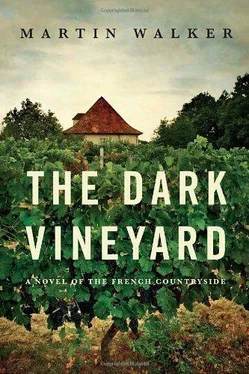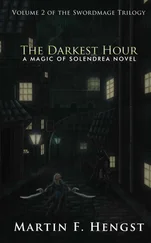Martin Walker - The dark vineyard
Здесь есть возможность читать онлайн «Martin Walker - The dark vineyard» весь текст электронной книги совершенно бесплатно (целиком полную версию без сокращений). В некоторых случаях можно слушать аудио, скачать через торрент в формате fb2 и присутствует краткое содержание. Жанр: Полицейский детектив, на английском языке. Описание произведения, (предисловие) а так же отзывы посетителей доступны на портале библиотеки ЛибКат.
- Название:The dark vineyard
- Автор:
- Жанр:
- Год:неизвестен
- ISBN:нет данных
- Рейтинг книги:5 / 5. Голосов: 1
-
Избранное:Добавить в избранное
- Отзывы:
-
Ваша оценка:
- 100
- 1
- 2
- 3
- 4
- 5
The dark vineyard: краткое содержание, описание и аннотация
Предлагаем к чтению аннотацию, описание, краткое содержание или предисловие (зависит от того, что написал сам автор книги «The dark vineyard»). Если вы не нашли необходимую информацию о книге — напишите в комментариях, мы постараемся отыскать её.
The dark vineyard — читать онлайн бесплатно полную книгу (весь текст) целиком
Ниже представлен текст книги, разбитый по страницам. Система сохранения места последней прочитанной страницы, позволяет с удобством читать онлайн бесплатно книгу «The dark vineyard», без необходимости каждый раз заново искать на чём Вы остановились. Поставьте закладку, и сможете в любой момент перейти на страницу, на которой закончили чтение.
Интервал:
Закладка:
He put his hat on top of the bookcase, beside the FBI baseball cap that a friend had brought him after a vacation in New York, then squeezed between the filing cabinets and the wall to get behind his battered metal desk. He sat down, hearing the familiar squeak of his swivel chair, and looked down through the window at the busy roundabout and the bustle of the main shopping street behind it.
Most of the people he could see were tourists, studying the houses for sale in the real estate agents’ windows. Saint-Denis now boasted four bakeries, four salons, four real estate agencies, three banks and three shops selling foie gras and other local delicacies, but there was only one grocery and one butcher’s shop. The fishmonger had long since given way to an insurance agency. Another grocery had been replaced the previous winter by a business that serviced computers and sold cell phones and DSL lines for the Internet. And a butcher had retired in the spring and now rented his premises to a real estate agent. It was no longer the Saint-Denis Bruno had first come to a decade ago, when the small towns of rural France still retained the shops and the texture he remembered from his boyhood. Now people shopped at the supermarkets on the outskirts of town, or drove to the complex of shopping malls and hypermarkets outside Perigueux, forty minutes away. Bruno sighed and turned back to his desk.
He filled out the good conduct forms, signing and stamping each one with his seal, and signed the musicians’ contracts. He completed the paperwork for two death notices to be sent to the prefecture, and phoned Father Sentout to confirm the church for the funerals. Then something jogged his memory. He had signed another batch of good conduct forms earlier in the year. He looked at his file of copies, and there he found what he was looking for: an application for a summer job as a lab assistant at the Agricultural Research Station for Dominique Suchet, Stephane’s daughter. He and J-J had interviewed the permanent staff, checking the backgrounds of the technicians and the farmworkers. But he hadn’t thought about the summer workers. Putain. That meant more work, but it had to be done.
Bruno paused. Dominique had been at the scene of the fire with her father-natural enough since their farm was just down the hill. Still, it was an interesting coincidence. He looked again at Dominique’s good conduct form, which contained a recommendation from the headmaster of the town college, the secondary school where the kids went before going on to the lycee. He picked up the phone and called Rollo, the headmaster.
Rollo told him Dominique was a very promising girl, good at math and science. She’d done well at the lycee and was now studying computer science at a university in Grenoble. She was a hard worker and had been captain of the school swimming team. Bruno began to scribble notes as Rollo described how during a mock election, Dominique and her partner had held meetings about global warming and melting ice caps, plastered the school with posters about it and defeated the Socialist favorites to pull off a victory for the Greens. When he asked who had been her partner, Rollo said it had been Max, Alphonse’s son.
Bruno thanked Rollo and put down the phone. The prospect of a militant young Green at the research station, doubtless knowing about the GMO project, with a father whose farm was near the trial crops, was by far the best lead in a case where he was making no progress. But Stephane was a friend of his. He’d have to make some inquiries of his own before talking to J-J, at least to establish whether the girl had a decent alibi for the time of the fire. He rose and was reaching for his cap when Claire put her head around his door to say the mayor needed to see him.
“I like the new haircut, Bruno,” she added, lingering in the doorway.
“It’s the same one I get every month,” he said, grabbing his notebook.
“No, it’s shorter,” she said, edging closer to the door so that he had to squeeze past. “It makes you look younger.”
“But I’m even older now than I was when it was cut,” he said, and left her nonplussed.
His spirits rose as they always did when he entered the mayor’s office. The rich colors of old wood and paneling and faded rugs could hardly have been more different from those of his own cramped and functional office, or from the modernized reception area. The mayor kept to the old ways, preferring his fountain pen to a computer terminal, and the traditional system of manila file folders bound with green and red tape over some electronic database.
“Bonjour, Bruno. I had a call earlier from the American embassy in Paris, commercial section, following up on a letter they sent that somehow Claire seems to have misfiled. Could we receive some distinguished businessman who wants to discuss a possible investment in our region?”
“What kind of investment?”
“They didn’t say. But I’d be glad of anything. We need the jobs. The meeting is here in my office, tomorrow at 9 a.m. I’d like you to be there, along with Xavier.” Xavier was the maire-adjoint, as well as one of Bruno’s tennis partners, and probably would be the next mayor when Gerard Mangin eventually stepped down.
“Did we get a name?” Bruno asked.
“Only if Claire finds that letter.”
“If the meeting is at nine, they’ll be staying in a hotel near here. I’ll call around, find out the name and see what I can dig up.”
“It could be just some big political donor looking to buy a chateau,” the mayor speculated. Bruno knew him to be an old-school politician who had learned his skills as an aide to Jacques Chirac around the time Bruno had been born. “Still no progress on the fire?”
“Only that we got the lab report confirming the presence of gasoline. It was arson, all right. But we’re no nearer to knowing who or why. The staff all seem to be in the clear, so J-J is working on possible competitors, and I’m supposed to make discreet inquiries among the locals, starting with the ecolos and then the nearby farmers who might have been worried about contamination of their crops. But first I want to find out a bit more about the anonymous call alerting us to the fire. It came from the phone booth at Coux. It’s a long shot, but somebody may have seen or heard something.”
6
Back in his office, Bruno tracked down the American businessman at the Centenaire in Les Eyzies, the grandest hotel in the district, with a restaurant that boasted a Michelin rosette. Therese at the hotel’s reception desk had a daughter in Bruno’s tennis class. He took hasty notes as Therese told him everything she knew. A young man named Fernando Bondino had arrived in a big Mercedes and taken the presidential suite, at a cost of nearly a thousand euros a night. He had demanded an Internet connection the moment he checked in, then had ordered the menu degustation and a bottle of Chateau Petrus, followed by the best Armagnac. The booking had been made by the Dupuy consultancy in Paris, on the avenue Monceau. Bruno checked his notebook for the names he had scribbled down at the wine shop. The address and the phone number were the same. Monsieur Dupuy had booked a room at the hotel that night.
Bruno fired up his computer, typed in Google. fr and looked up the name Bondino. A flood of page references came up, starting with Bondino Wines, Inc., in English and in Spanish. He understood enough to see that they ran vineyards in California, Chile, Australia and South Africa and were clearly a very large and rich company. He turned back to the main Google page and found articles in French from Figaro, Marianne and Les Echos, the business paper. The Figaro piece was an interview, which he printed out, marking the passage in which the head of the company, Francis X. Bondino, was asked if his global wine empire would ever spread to France.
Читать дальшеИнтервал:
Закладка:
Похожие книги на «The dark vineyard»
Представляем Вашему вниманию похожие книги на «The dark vineyard» списком для выбора. Мы отобрали схожую по названию и смыслу литературу в надежде предоставить читателям больше вариантов отыскать новые, интересные, ещё непрочитанные произведения.
Обсуждение, отзывы о книге «The dark vineyard» и просто собственные мнения читателей. Оставьте ваши комментарии, напишите, что Вы думаете о произведении, его смысле или главных героях. Укажите что конкретно понравилось, а что нет, и почему Вы так считаете.












